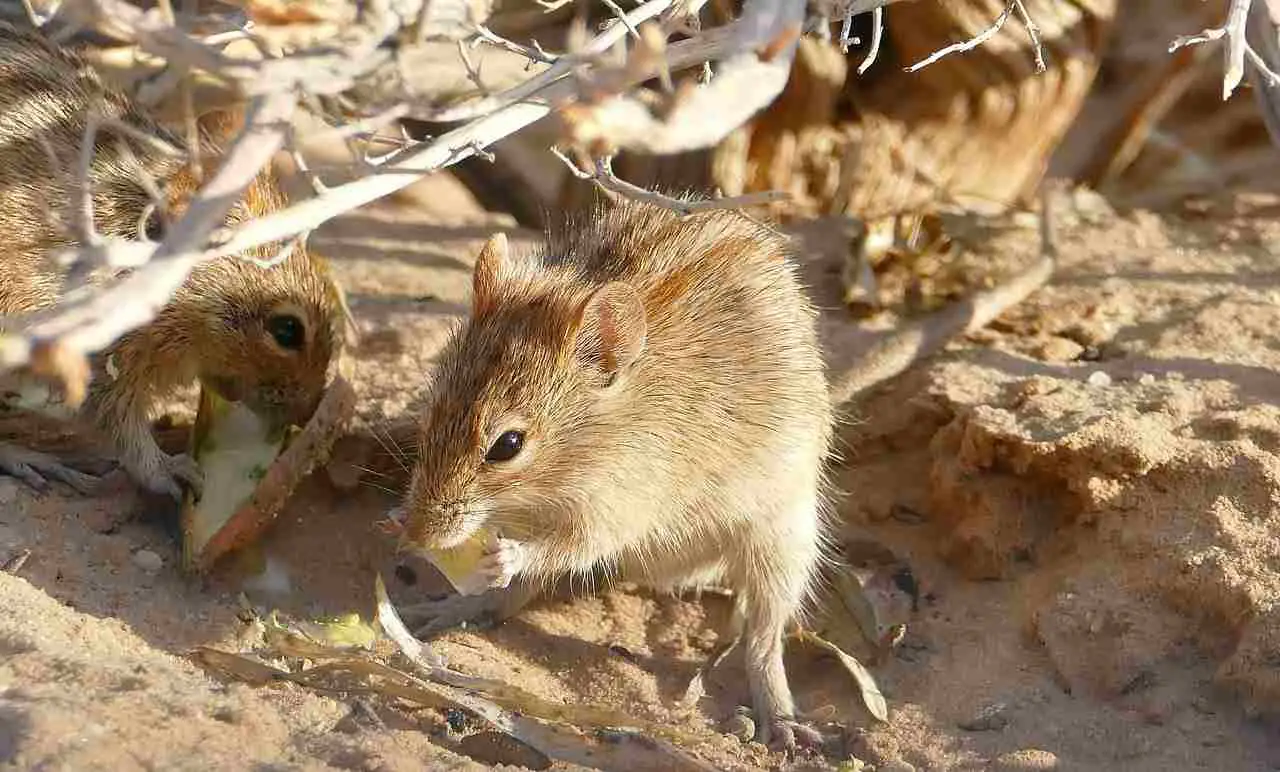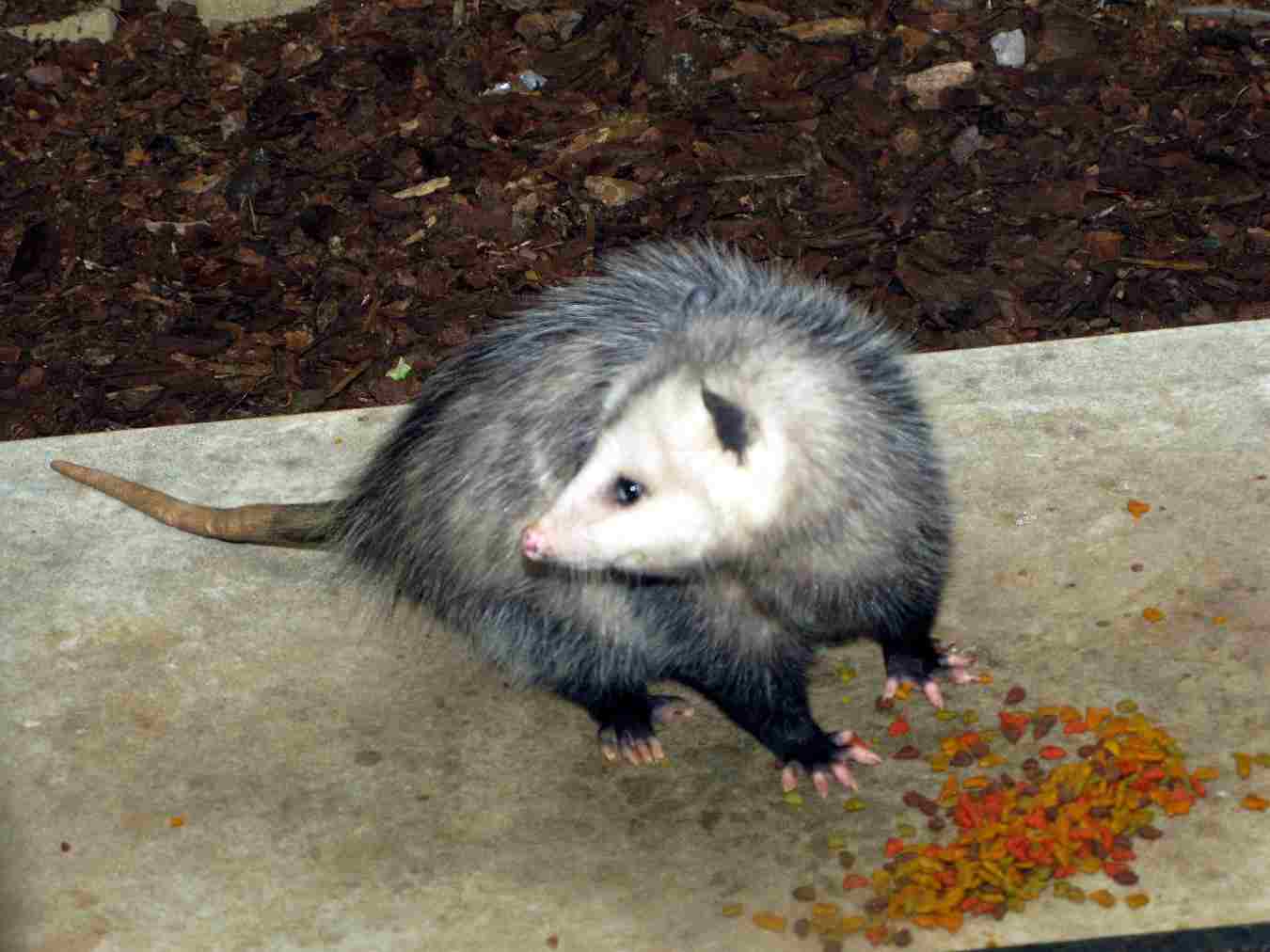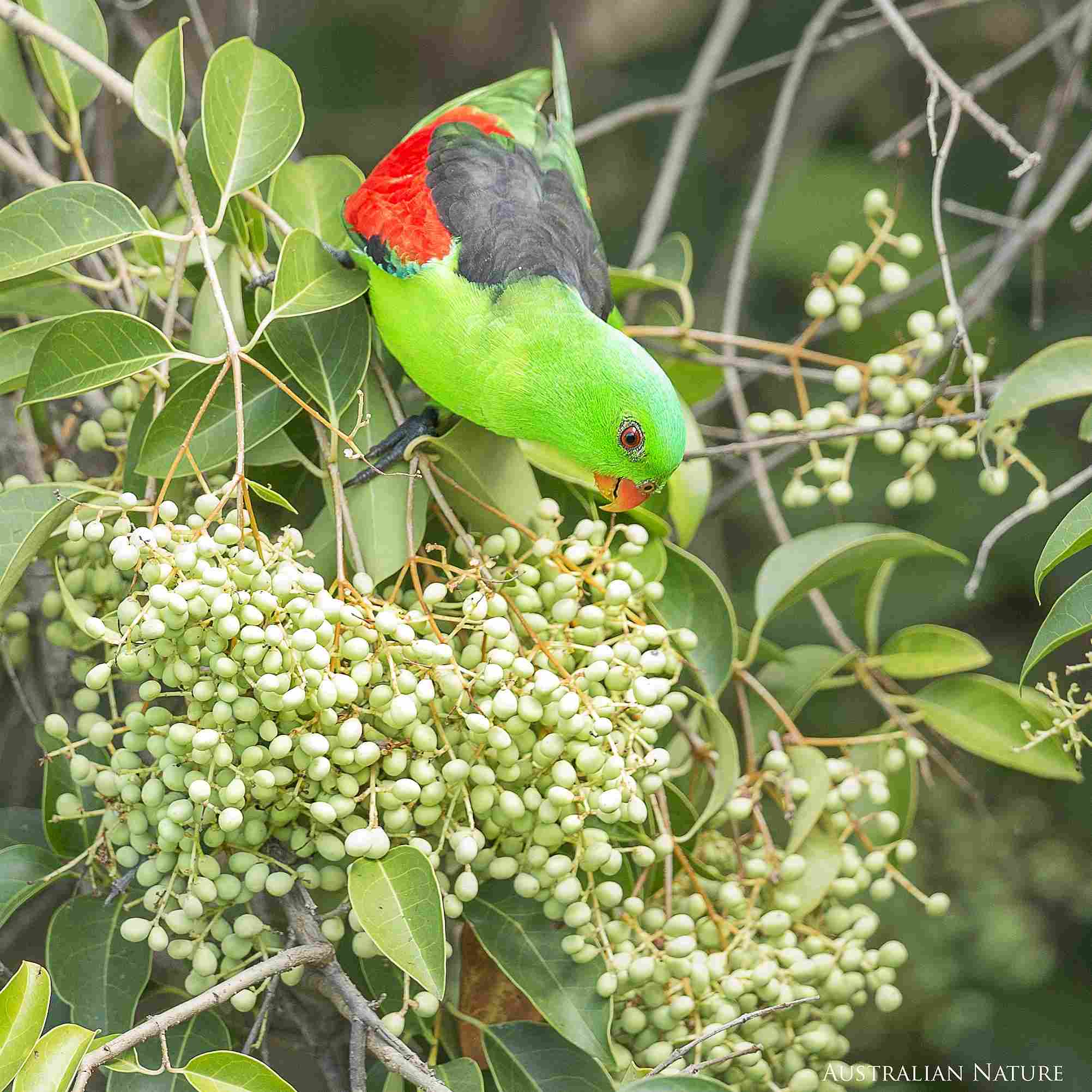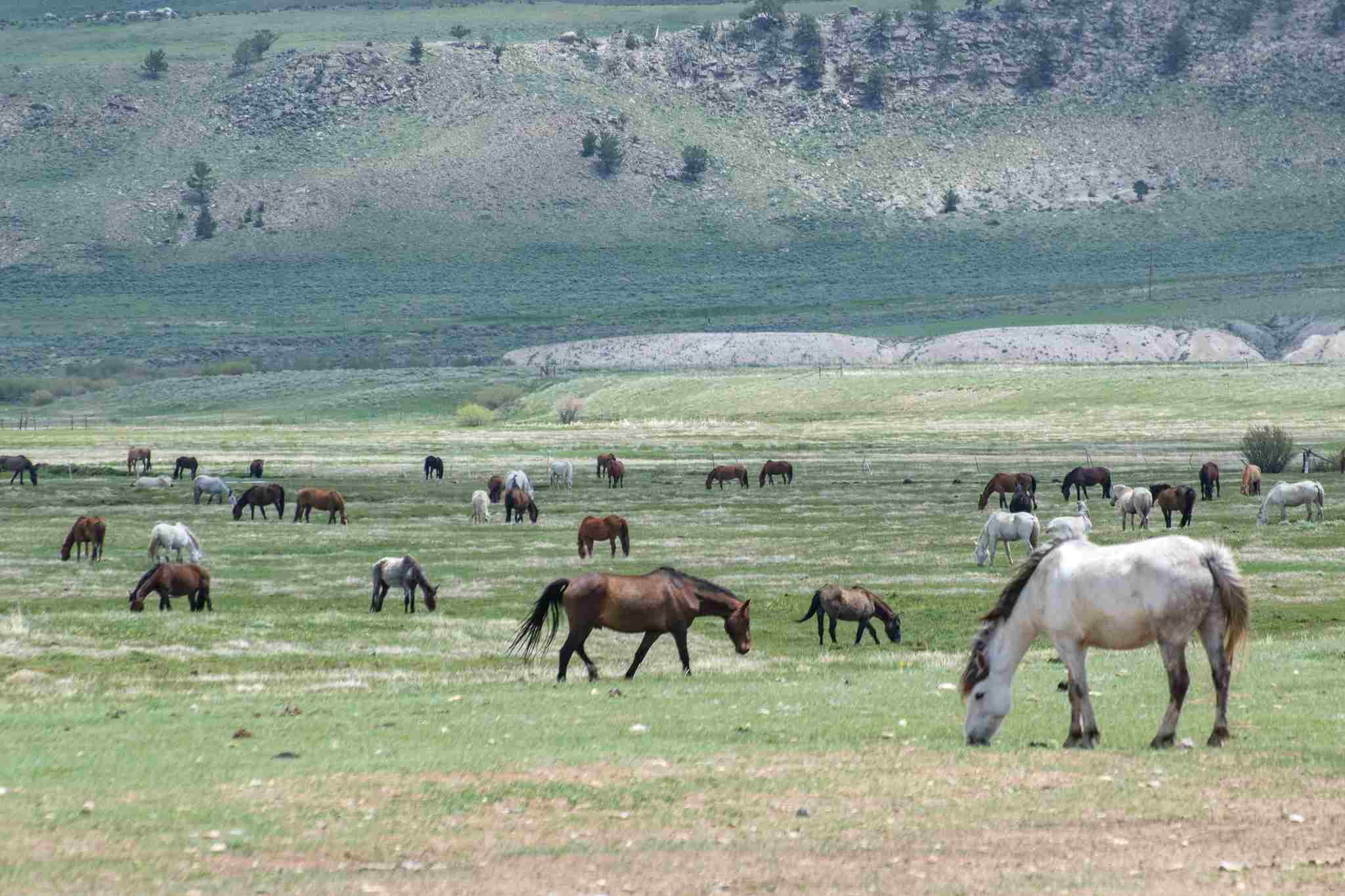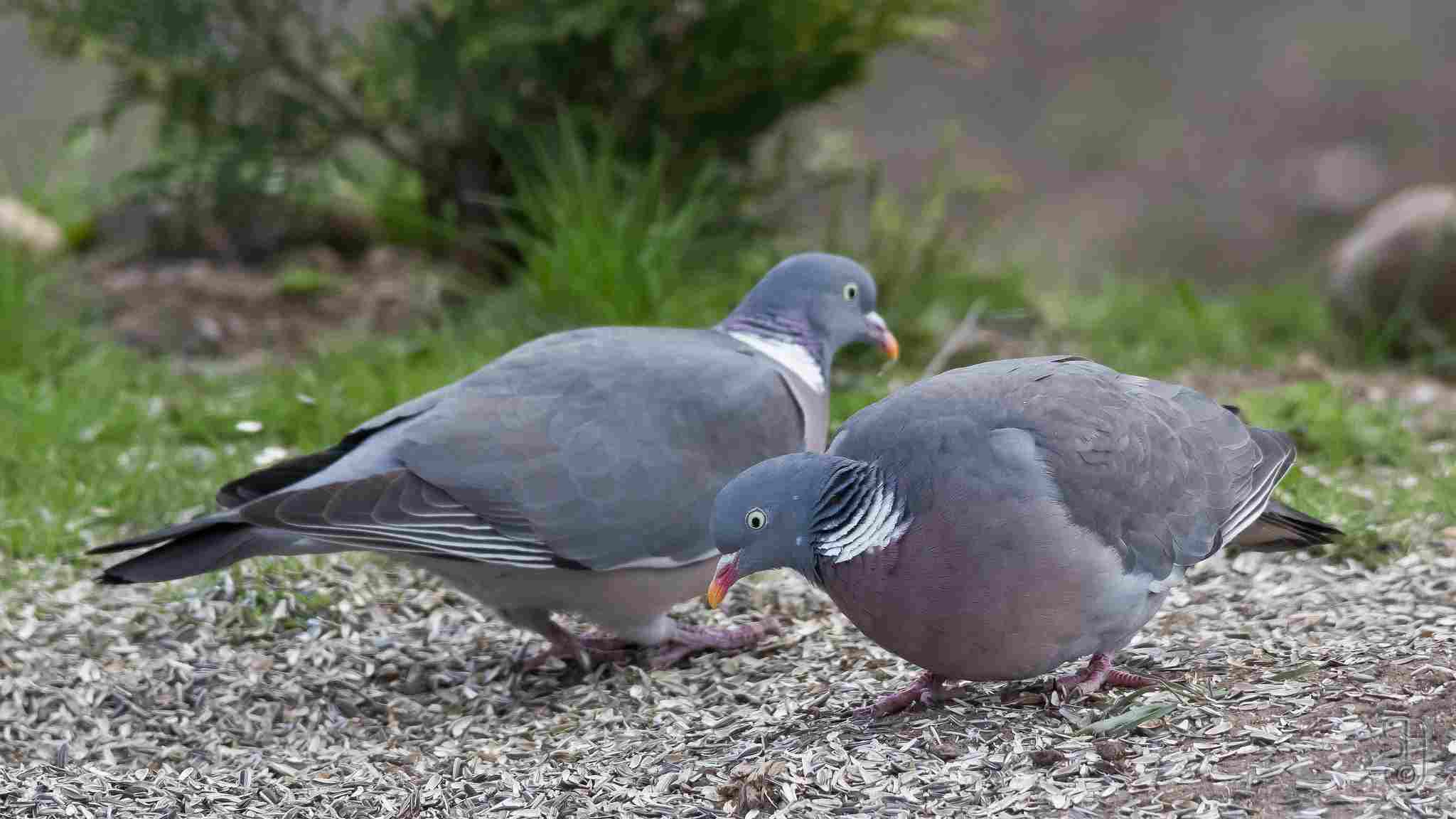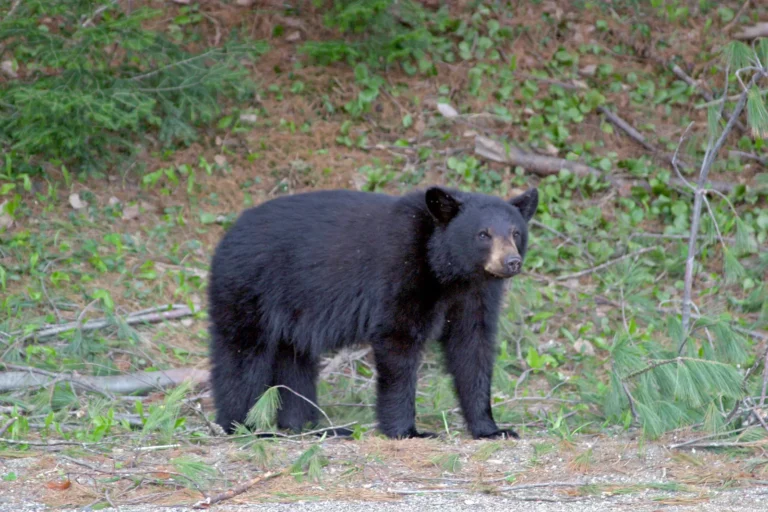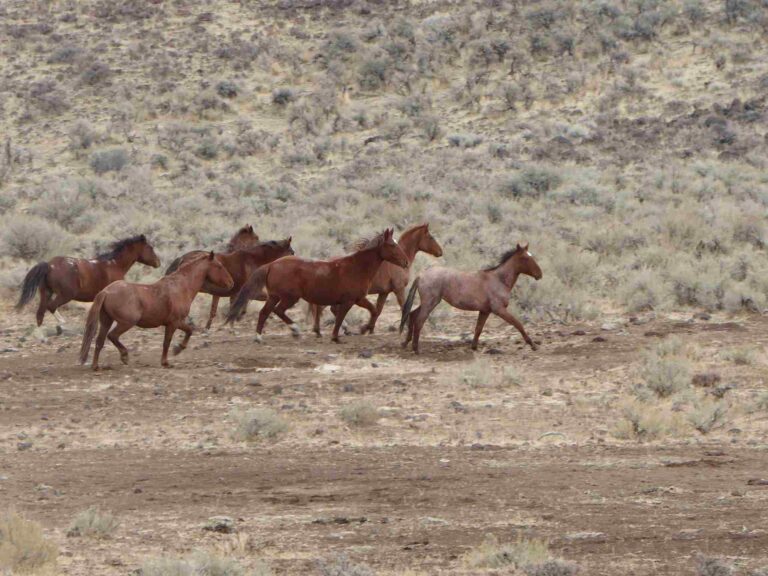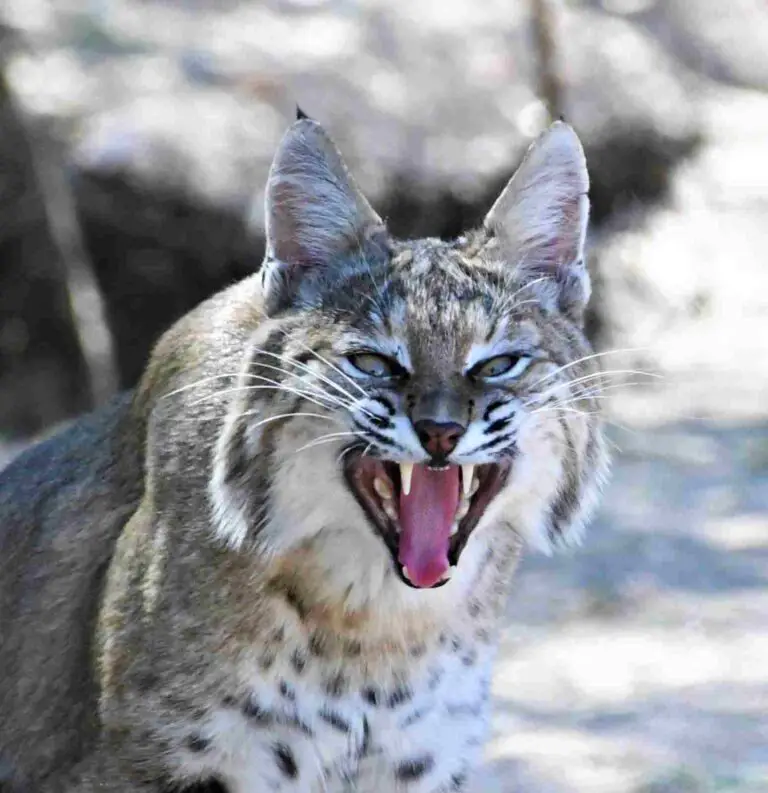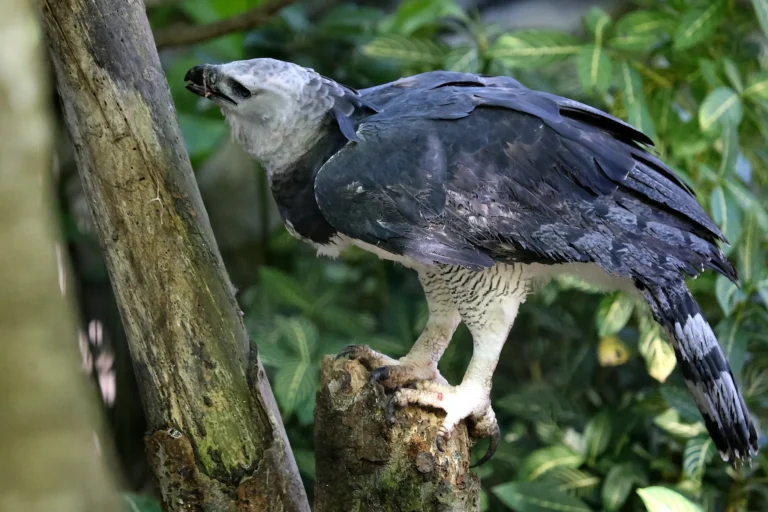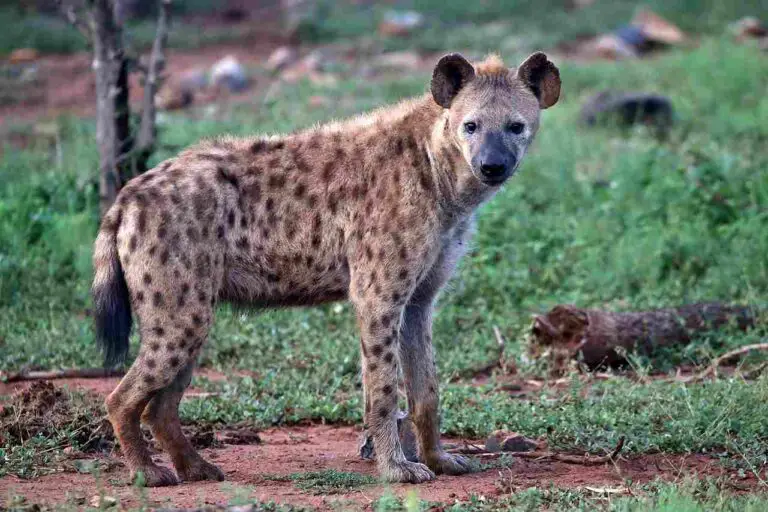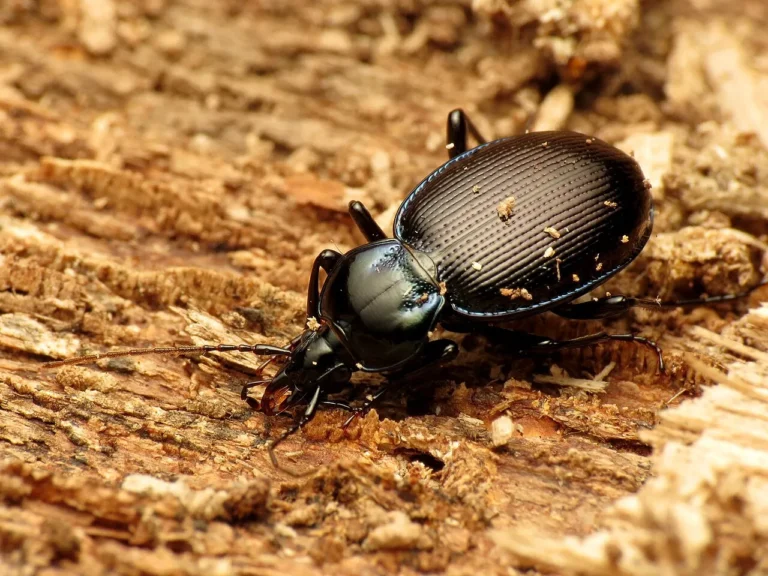What Can You Feed Pigeons? 13+ Best Foods for Pigeons Discussed
What you can feed pigeons includes; grains, seeds, nuts, berries, fruits, vegetable foliage, insects, worms, as well as some processed food items like bread, pasta, and bird feed.
This article highlights suitable food items for pigeons.
1). Grains
Grains are an essential part of a pigeon’s diet, providing them with the necessary energy and nutrients. There are several types of grains that you can feed pigeons, including sorghum, corn, millet, wheat, flax, rice, and barley.
Sorghum is a nutritious grain that is rich in protein and fiber, making it a great choice for pigeons. Corn is another popular grain that pigeons enjoy, and it is packed with carbohydrates and essential vitamins. Millet is a small grain that is easy for pigeons to eat, and it provides them with a good source of energy. Wheat is a staple grain that is commonly fed to pigeons, and it is high in protein and fiber. Flax is a nutritious grain that is rich in omega-3 fatty acids, which are important for a pigeon’s overall health. Rice is a versatile grain that can be cooked and fed to pigeons, providing them with carbohydrates and essential nutrients. Lastly, barley is a nutritious grain that is high in fiber and provides pigeons with a good source of energy.
When feeding grains to pigeons, it is important to ensure that they are clean and free from any contaminants. You can offer grains to pigeons in a feeder or scatter them on the ground for them to peck at. It is also important to provide fresh water alongside the grains to keep the pigeons hydrated.
2). Seeds
Seeds are another important component of a pigeon’s diet, providing them with a healthy supply of fiber, protein, carbohydrates, and various nutrients. There are several types of seeds that you can feed pigeons, including hemp seeds, sunflower seeds, and safflower seeds.
Hemp seeds are a nutritious option for pigeons, as they are rich in protein and contain essential fatty acids. Sunflower seeds are a popular choice and are packed with nutrients like vitamin E, magnesium, and selenium. Safflower seeds are also a good option, providing pigeons with a good source of protein and healthy fats.
Seeds can be mixed together to create a balanced diet for pigeons. This allows them to receive a variety of nutrients from different seed types. Mixing seeds also adds variety to their diet, making mealtime more interesting for them.
Seeds can be used interchangeably with grains in a pigeon’s diet. They can be offered in a feeder or scattered on the ground for pigeons to peck at. It is important to ensure that the seeds are clean and free from any contaminants before feeding them to pigeons.
When feeding seeds to pigeons, it is important to use clear and simple language. Avoid including more than two sentences per paragraph to maintain readability. Providing clear and concise information about the seeds that pigeons can eat helps pigeon owners make informed decisions about their pets’ diet.
3). Nuts
Nuts are another nutritious option for feeding pigeons, providing them with a variety of essential nutrients. Pigeons can eat a range of nuts, including walnuts, almonds, chestnuts, pecans, peanuts, and pistachios. These nuts can be offered to pigeons either raw or roasted, and they can be shelled or unshelled.
Nuts are a great source of fiber, protein, and healthy fats, which are all important for a pigeon’s overall health and well-being. Fiber helps to support digestion, while protein is essential for muscle development and repair. The healthy fats found in nuts provide pigeons with energy and help to maintain their feathers and skin in good condition.
When feeding nuts to pigeons, it is important to ensure that they are clean and free from any contaminants. Avoid offering salted or flavored nuts, as these can be harmful to pigeons. Instead, opt for raw and unsalted nuts to provide the healthiest option for your feathered friends.
To offer nuts to pigeons, you can scatter them on the ground or place them in a feeder. Pigeons will enjoy pecking at the nuts and cracking open the shells to access the tasty kernels inside. This activity also provides mental stimulation for pigeons, keeping them entertained and engaged.
4). Berries
Berries are a delicious and nutritious option for feeding pigeons. Pigeons can enjoy a variety of berries, including raspberries, blueberries, strawberries, blackberries, and Hawthorn berries. These berries are not only tasty but also provide essential vitamins and antioxidants that contribute to the overall health of pigeons.
Berries are rich in vitamins C and K, which help boost the immune system and promote healthy blood clotting. They also contain antioxidants that protect the pigeons’ cells from damage caused by harmful free radicals.
To offer berries to pigeons, you can scatter them on the ground or place them in a feeder. Pigeons will peck at the berries and enjoy the sweet and juicy flavors.
When feeding berries to pigeons, it’s important to ensure that they are fresh and free from any pesticides or chemicals. Wash the berries thoroughly before offering them to the pigeons to remove any potential contaminants.
Including a variety of berries in a pigeon’s diet can provide them with a range of nutrients and flavors. Remember to offer berries in moderation as part of a balanced diet for pigeons.
5). Fruits
Fruits are a delicious and nutritious addition to a pigeon’s diet. Pigeons can enjoy a variety of fruits, including plums, pears, grapes, raisins, cherries, bananas, apples, and figs. These fruits not only provide a sweet and juicy treat for pigeons but also offer a range of essential vitamins and minerals.
Including fruits in a pigeon’s diet can provide them with important nutrients such as vitamin C, which supports their immune system and helps protect against diseases. Fruits also contain dietary fiber, which aids in digestion and promotes a healthy digestive system for pigeons.
When offering fruits to pigeons, it’s important to prepare them appropriately. For example, bananas can be chopped up into small pieces for easier consumption. You can scatter the fruits on the ground or place them in a feeder for the pigeons to enjoy.
It’s crucial to ensure that the fruits are fresh and ripe, as pigeons are more likely to eat them when they are at their peak flavor. Avoid offering fruits that are overripe or spoiled, as they may not be as appealing to the pigeons and could potentially cause digestive issues.
Remember to wash the fruits thoroughly before offering them to the pigeons to remove any pesticides or chemicals. This will help ensure the safety and well-being of the pigeons.
Including a variety of fruits in a pigeon’s diet can provide them with different flavors and textures, making their meals more enjoyable. However, it’s important to offer fruits in moderation as part of a balanced diet for pigeons.

6). Vegetable Foliage
Vegetable foliage is an important part of a pigeon’s diet, providing them with essential nutrients and fiber. Pigeons can enjoy a variety of vegetables, including kale, cauliflower, lettuce, carrot, spinach, snap peas, dandelion greens, broccoli, and cabbage. These vegetables offer a range of vitamins and minerals that contribute to the overall health and well-being of pigeons.
Including vegetable foliage in a pigeon’s diet can provide them with important nutrients such as vitamin A, vitamin K, and folate. Vitamin A is essential for maintaining healthy eyesight and promoting proper growth and development. Vitamin K plays a crucial role in blood clotting and bone health, while folate supports cell growth and function.
When offering vegetable foliage to pigeons, it’s important to prepare them appropriately. For example, lettuce can be torn into smaller pieces for easier consumption. You can scatter the vegetable foliage on the ground or place them in a feeder for the pigeons to enjoy.
It’s crucial to ensure that the vegetable foliage is fresh and free from any pesticides or chemicals. Washing the vegetables thoroughly before offering them to the pigeons will help remove any potential contaminants and ensure the safety of the birds.
Including a variety of vegetable foliage in a pigeon’s diet can provide them with different flavors and textures, making their meals more enjoyable. However, it’s important to offer vegetable foliage in moderation as part of a balanced diet for pigeons.
Reiterating the above, vegetable foliage is a nutritious and beneficial addition to a pigeon’s diet. By including vegetables such as kale, cauliflower, lettuce, carrot, spinach, snap peas, dandelion greens, broccoli, and cabbage, pigeons can receive essential vitamins and minerals that contribute to their overall health and well-being. Remember to prepare the vegetable foliage appropriately and ensure its freshness and safety before offering it to the pigeons.
7). Insects and Arachnids
Pigeons have a natural instinct for foraging, and they can find a variety of insects and arachnids to consume. Flies, ants, beetles, spiders, and caterpillars are all examples of insects and arachnids that pigeons can eat. These small creatures are part of the natural diet of pigeons and provide them with essential nutrients.
Insects and arachnids are a valuable source of protein for pigeons. Protein is crucial for their growth, development, and overall health. It helps in building and repairing tissues, supporting the immune system, and providing energy. By consuming insects and arachnids, pigeons can meet their protein requirements and maintain their well-being.
It’s important to note that you don’t have to actively feed insects and arachnids to pigeons. These creatures are abundant in the environment, and pigeons will naturally find them while foraging. Pigeons have a keen sense of sight and can spot insects and arachnids crawling or flying around. They will peck at them and consume them as part of their diet.
When it comes to offering insects and arachnids to pigeons, it’s crucial to ensure that they are safe and free from any harmful substances. Avoid using pesticides or insecticides in areas where pigeons forage to prevent contamination of the insects and arachnids they consume.
Therefore, insects and arachnids are a natural and nutritious part of a pigeon’s diet. Flies, ants, beetles, spiders, and caterpillars are examples of insects and arachnids that pigeons can consume. These small creatures provide pigeons with essential protein and contribute to their overall health and well-being. Remember that pigeons will find insects and arachnids while foraging, so there is no need to actively feed them. Ensure the safety of these creatures by avoiding the use of harmful substances in areas where pigeons forage.
8). Mollusks
Mollusks, such as snails and slugs, are another type of food that you can feed pigeons. These small creatures are part of the natural diet of pigeons and can provide them with essential nutrients. Mollusks are a good source of protein, which is important for the growth, development, and overall health of pigeons. Protein helps in building and repairing tissues, supporting the immune system, and providing energy.
While you can provide mollusks as food for pigeons, they can also find them while foraging. Pigeons have a keen sense of sight and can spot snails and slugs crawling on the ground or on plants. They will peck at them and consume them as part of their diet.
When offering mollusks to pigeons, it’s important to ensure that they are safe and free from any harmful substances. Avoid using pesticides or chemicals in areas where pigeons forage to prevent contamination of the mollusks they consume.
Therefore, mollusks, such as snails and slugs, are a natural and nutritious part of a pigeon’s diet. They provide pigeons with essential protein and contribute to their overall health and well-being. Remember that pigeons can find mollusks while foraging, so there is no need to actively feed them. Ensure the safety of these creatures by avoiding the use of harmful substances in areas where pigeons forage.
9). Worms
Worms are another type of food that you can feed pigeons. There are various types of worms that pigeons can consume, including earthworms, mealworms, phoenix worms, and red worms. These worms are rich in nutrients and can provide essential protein for the pigeons’ diet.
Mealworms, in particular, are a popular choice for feeding pigeons. These small insect larvae are readily available and can be easily purchased from pet stores or online. Pigeons enjoy the taste of mealworms and they provide a good source of protein for their growth and overall health.
In addition to mealworms, pigeons may also find other types of worms and larvae while foraging. They have a keen sense of sight and can spot worms crawling on the ground or in vegetation. Pigeons will peck at these worms and consume them as part of their natural diet.
Worms are a suitable food option for pigeons and can be included as part of their regular diet. They offer a natural source of protein and contribute to the pigeons’ overall well-being. However, it’s important to ensure that the worms are safe for consumption. Avoid using pesticides or chemicals in areas where pigeons forage to prevent contamination of the worms they consume.
10). Bread
While bread can be fed to pigeons, it should be done sparingly. Bread is not a nutritious food for pigeons and can cause constipation and digestion problems if given in large quantities. It is important to remember that bread is often high in sugar and lacks the essential nutrients that pigeons need for their overall health and well-being.
If you choose to feed bread to pigeons, it is best to offer small bits or crumbs rather than whole slices. This helps to prevent overconsumption and reduces the risk of digestive issues. Additionally, it is recommended to avoid giving bread that is salted, as excessive salt intake can be harmful to pigeons.
While bread can be a convenient option for feeding pigeons, it should not be the sole source of their diet. Pigeons require a balanced and varied diet to meet their nutritional needs. Bread can be offered as a treat or supplement to other foods that are more suitable for pigeons, such as grains, seeds, fruits, and vegetables.
To ensure the health and well-being of pigeons, it is important to provide them with a diverse range of foods that meet their nutritional requirements. By offering a balanced diet, you can help to support their growth, immune system, and overall vitality.
11). Pasta
Pasta is another type of processed food that can be fed to pigeons, although it should be given sparingly. Similar to bread, pasta is not a highly nutritious food for pigeons and should not be the main component of their diet. It is important to choose pasta that is not salted, as excessive salt intake can be harmful to pigeons.
When offering pasta to pigeons, it is best to break it into small pieces or crumbs to prevent overconsumption. Mixing pasta with other food sources is also recommended to ensure a balanced diet for pigeons. While pasta can be included as part of the foods suitable for pigeons, it should not be the sole source of nutrition.
Pigeons require a diverse range of foods to meet their nutritional needs and maintain their overall health. Grains, seeds, fruits, and vegetables are all important components of a pigeon’s diet. These foods provide essential nutrients and contribute to their growth, immune system, and vitality.
Incorporating pasta into a pigeon’s diet can be done as a treat or supplement to other more nutritious foods. However, it is crucial to remember that pasta should not replace the main sources of nutrition for pigeons. Offering a variety of foods ensures that pigeons receive a well-rounded diet that supports their overall well-being.
12). Bird Feed
Bird feed is an ideal option for feeding pigeons when it is available and affordable. It contains a mix of various food materials that are highly nutritious for pigeons. The ingredients in bird feed include water, brown rice, white quinoa, farro, vegetable oil, onion, salt, garlic, lemon juice concentrate, herb, parsley, and sunflower lecithin.
Bird feed is a convenient and balanced option for providing pigeons with the essential nutrients they need. It is formulated to meet the dietary requirements of birds, including pigeons. The combination of grains, seeds, and other ingredients in bird feed ensures that pigeons receive a well-rounded diet that supports their overall health and vitality.
Including bird feed as part of the foods suitable for pigeons is a great way to provide them with a diverse range of nutrients. The grains and seeds in bird feed are rich in carbohydrates, proteins, and fats, which are essential for pigeons’ energy levels and growth. Additionally, the other ingredients in bird feed contribute to pigeons’ immune system and overall well-being.
When offering bird feed to pigeons, it is important to do so in moderation. While bird feed is highly nutritious, it should not be the sole source of nutrition for pigeons. It is recommended to supplement bird feed with other foods such as fruits, vegetables, and insects to ensure a balanced diet.
To feed pigeons bird feed, it is best to scatter it on the ground or in a feeding tray. This allows pigeons to peck at the feed and consume it at their own pace. Providing fresh water alongside bird feed is also important to keep pigeons hydrated.
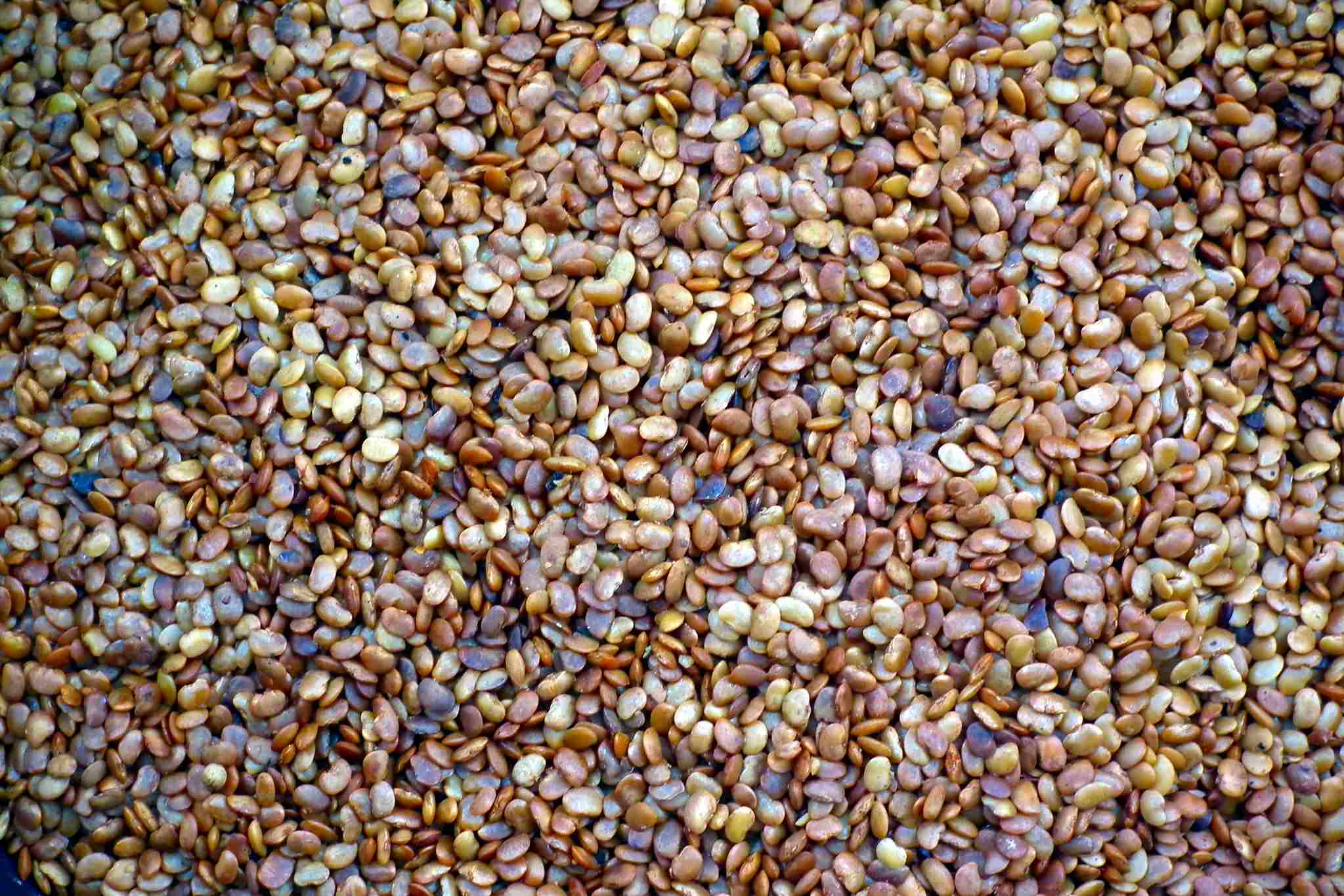
13). Potato
Potatoes are a great addition to the list of foods suitable for pigeons. However, it is important to note that potatoes are best served cooked. Boiling potatoes without salt is a simple and effective way to prepare them for pigeons. This cooking method helps reduce the starch content, making it easier for pigeons to digest.
Potatoes provide pigeons with essential nutrients such as carbohydrates, vitamins, and minerals. They are a good source of energy, which is important for pigeons’ daily activities and overall health. Additionally, potatoes contain fiber, which aids in digestion and promotes a healthy digestive system for pigeons.
To feed pigeons potatoes, it is recommended to chop them into small bits and serve them either individually or mixed with other foods.
14). Boiled Egg
Boiled eggs serve as a nutritious protein source for pigeons. They are a valuable addition to the list of foods suitable for pigeons due to their high protein content. Protein is essential for pigeons’ growth, development, and overall health.
To feed pigeons boiled eggs, you can chop them into small bits and serve them either individually or mixed with other foods. It is important to note that pigeons can consume the entire boiled egg, including the white and yolk.
Eggs provide pigeons with a range of essential nutrients, including vitamins, minerals, and amino acids. These nutrients support various bodily functions and contribute to pigeons’ overall well-being. Additionally, eggs are easily digestible for pigeons, making them an ideal food choice.
Including boiled eggs in pigeons’ diet can help meet their nutritional needs and promote optimal health. However, it is important to offer eggs in moderation and as part of a balanced diet.
What Can Pigeons Eat?
Pigeons have a diverse diet that includes a variety of foods. Grains, such as sorghum, are a staple in a pigeon’s diet. They provide essential carbohydrates and energy for these birds. Other grains that pigeons can eat include corn, wheat, and barley. These grains can be offered in their whole form or as part of a bird feed mix.
In addition to grains, pigeons can also enjoy fruits like berries. Berries are a great source of vitamins and antioxidants for pigeons. Blueberries, strawberries, and raspberries are all suitable options. These fruits can be served fresh or dried, providing a tasty and nutritious treat for pigeons.
Seeds are another important component of a pigeon’s diet. Sunflower seeds, in particular, are a favorite among pigeons. They are rich in healthy fats and provide essential nutrients like vitamin E. Other seeds that pigeons can eat include pumpkin seeds and sesame seeds.
Vegetable foliage is also a part of a pigeon’s diet. Leafy greens like spinach and lettuce are excellent choices. These vegetables provide essential vitamins and minerals for pigeons’ overall health. Additionally, vegetables like carrots and peas can be offered as a source of additional nutrients.
When it comes to protein, pigeons can benefit from insects and arachnids. Mealworms and crickets are popular choices. These protein-rich foods help support muscle development and growth in pigeons.
To ensure a balanced diet, it is important to offer a variety of foods to pigeons. This includes mollusks like snails and worms. These foods provide additional protein and essential nutrients.
Can Pigeons Eat Rice?
Yes, both raw and cooked rice can be included in a pigeon’s diet. Rice is a versatile food that can be fed to pigeons in different forms. They can consume leftover cooked rice, whether it is boiled and unsalted, or uncooked grains.
Rice is a good source of carbohydrates, which provide energy for pigeons. It can be a convenient option to include in their diet, especially if you have leftover rice from your own meals. Just make sure that the cooked rice is plain and does not contain any added seasonings or salt.
If you prefer to feed uncooked rice to pigeons, it is important to note that they may find it easier to consume if the grains are lightly ground. This can help with swallowing and digestion. However, it is not necessary to grind the rice if you are offering cooked rice.
When feeding rice to pigeons, it is essential to ensure that it is a part of a balanced diet. Rice should not be the sole food source for pigeons, as they require a variety of nutrients from different foods. It is recommended to supplement their diet with other suitable foods like grains, seeds, fruits, and vegetables.
Homemade Pigeon Feed
Homemade Pigeon Feed is a cheaper alternative to packaged feeds from the market. It can be prepared by mixing various grains and seeds, providing a nutritious and balanced diet for pigeons. Some common ingredients for homemade pigeon feed include wheat, maple seeds, barley, millet, corn, cowpeas, and flax seeds. These grains and seeds are rich in essential nutrients that pigeons need to thrive.
When preparing homemade pigeon feed, it is important to consider the size of the grains and seeds. Pigeons may find it easier to consume if the grains are lightly ground, as this can aid in swallowing and digestion. However, if you are using cooked grains like rice or barley, grinding is not necessary.
In addition to grains and seeds, you can also supplement the homemade pigeon feed with other edible food sources. Vegetables and fruits can be offered occasionally to provide additional nutrients and variety in their diet. Some suitable options include leafy greens, carrots, peas, apples, and berries. Just make sure to chop or dice the vegetables and fruits into small, manageable pieces for the pigeons.
Bread can also be included in the homemade pigeon feed. However, it is important to use plain bread without any added seasonings or spreads. You can tear the bread into small pieces and mix it with the grains and seeds to create a more enticing and varied meal for the pigeons.
To serve the homemade pigeon feed, you can use feeders of various kinds. There are specially designed pigeon feeders available in the market, or you can use simple trays or bowls. Make sure to clean the feeders regularly to maintain hygiene and prevent the growth of mold or bacteria.
It is important to note that while homemade pigeon feed can be a cost-effective and nutritious option, it should not be the sole food source for pigeons. Pigeons require a diverse diet to meet all their nutritional needs. Therefore, it is recommended to supplement the homemade feed with other suitable foods like grains, seeds, fruits, and vegetables.
What Fruits Do Pigeons Eat?
Pigeons have a diverse diet that includes a variety of fruits. Some of the fruits that pigeons eat include apples, bananas, plums, figs, grapes, cherries, and raisins. These fruits provide pigeons with essential nutrients and fiber that contribute to their overall health and well-being.
Fruits are a great source of vitamins and minerals for pigeons. Apples, for example, are rich in vitamin C and dietary fiber, which can support their immune system and aid in digestion. Bananas are another fruit that pigeons enjoy, and they provide potassium and vitamin B6, which are important for maintaining healthy muscles and nerves.
Plums, figs, grapes, cherries, and raisins are also suitable fruits for pigeons. These fruits offer a range of nutrients, including antioxidants, which can help protect pigeons from oxidative stress and promote overall health.
When offering fruits to pigeons, it’s important to ensure that they are fresh and ripe. Avoid giving them fruits that are overripe or spoiled, as these can be harmful to their health. Additionally, it’s a good idea to chop or dice the fruits into small, manageable pieces to make it easier for pigeons to consume.
What Seeds Do Pigeons Eat?
Pigeons have a varied diet that includes a range of seeds. Some of the seeds that pigeons eat include sunflower seeds, hemp seeds, and safflower seeds. These seeds are not only tasty for pigeons but also provide them with essential proteins and nutrients.
Sunflower seeds are a popular choice among pigeons. They are rich in healthy fats, proteins, and vitamins, making them a nutritious snack for these birds. Hemp seeds are another seed that pigeons enjoy. They are packed with essential amino acids, omega-3 fatty acids, and minerals, which contribute to the overall health and well-being of pigeons.
Safflower seeds are also a favorite among pigeons. These seeds are high in protein and fiber, providing pigeons with the energy they need. Additionally, safflower seeds contain antioxidants that can help boost the immune system of pigeons.
When offering seeds to pigeons, it’s important to ensure that they are fresh and of high quality. Avoid giving them seeds that are moldy or spoiled, as these can be harmful to their health. It’s also a good idea to provide a variety of seeds to pigeons to ensure they receive a balanced diet.
What Vegetables Do Pigeons Eat?
Pigeons have a diverse diet that includes a variety of vegetables. Leafy and fiber-rich vegetables are particularly beneficial for pigeons as they provide essential nutrients and hydration. Some of the vegetables that pigeons eat include spinach, cabbage, celery, lettuce, turnip, broccoli, dandelion, carrot, and cauliflower.
Spinach is a nutritious vegetable that pigeons enjoy. It is packed with vitamins A, C, and K, as well as iron and calcium. These nutrients contribute to the overall health and well-being of pigeons. Cabbage is another vegetable that pigeons can eat. It is a good source of fiber and contains vitamins C and K, which support the immune system and promote healthy digestion.
Celery is a hydrating vegetable that pigeons find appealing. It is rich in water content and provides pigeons with essential hydration. Lettuce is also a favorite among pigeons. It is low in calories and high in water content, making it a refreshing and hydrating option for these birds.
Turnip is a root vegetable that pigeons can eat. It is a good source of fiber and contains vitamins C and K, as well as minerals like potassium and manganese. Broccoli is another vegetable that pigeons enjoy. It is rich in fiber, vitamins C and K, and antioxidants, which contribute to the overall health and vitality of pigeons.
Dandelion is a leafy green that pigeons can eat. It is high in fiber and contains vitamins A, C, and K, as well as minerals like iron and calcium. Carrots are a popular vegetable among pigeons. They are rich in beta-carotene, which is converted into vitamin A in the body. Carrots also provide pigeons with fiber and hydration.
Cauliflower is a vegetable that pigeons can eat in moderation. It is a good source of fiber and contains vitamins C and K. However, it should be given sparingly as it can cause digestive issues if consumed in large quantities.
When offering vegetables to pigeons, it’s important to wash them thoroughly and remove any pesticides or chemicals. It’s also recommended to chop the vegetables into small, manageable pieces to make it easier for pigeons to eat. Providing a variety of vegetables ensures that pigeons receive a balanced diet and all the necessary nutrients for their well-being.
What Can Pigeons Not Eat? A List of What Not to Feed Pigeons
What pigeons cannot eat includes apple seeds, avocado, chocolate, garlic, onions, caffeine, as well as salty, sugary or spicy foods (like chips). Food items produced for human consumption like bread and meat, should not be fed beyond sparingly to pigeons.
1). Apple Seeds
Pigeons cannot eat apple seeds. These small seeds contain a compound called amygdalin, which can release cyanide when ingested. Cyanide is highly toxic and can be fatal to pigeons and other birds. Therefore, it is important to remove apple seeds before offering apples to pigeons as a treat.
Apple seeds are not the only part of the apple that pigeons should avoid. The core and stem of the apple can also pose a choking hazard to pigeons. It is best to remove these parts and only offer the flesh of the apple to ensure the safety of the birds.
When feeding pigeons fruits, it is important to choose options that are safe and beneficial for their health. Instead of apples, you can offer pigeons fruits like berries, such as blueberries or strawberries, which are rich in antioxidants and provide essential vitamins.
Remember, pigeons have a delicate digestive system, and it is crucial to provide them with a balanced diet that meets their nutritional needs. Offering a variety of safe foods, such as grains, seeds, nuts, and vegetables, will help ensure their well-being.
2). Avocado
Avocado is another food that pigeons cannot eat. This fruit contains a substance called persin, which is toxic to birds. Persin can cause respiratory distress, heart failure, and even death in pigeons if ingested. Therefore, it is important to avoid feeding avocados to these birds.
In addition to persin, avocados are also high in fat content. Pigeons have a low tolerance for fatty foods, and consuming too much fat can lead to obesity and related health issues. It is best to stick to a balanced diet for pigeons that includes foods that are safe and beneficial for their well-being.
When it comes to feeding pigeons, it is important to prioritize their nutritional needs. Instead of avocados, you can offer them other fruits like berries or apples, which are safe and provide essential vitamins and antioxidants. Additionally, grains, seeds, and vegetables are also suitable options for pigeons.
By providing a varied and balanced diet, you can ensure the health and well-being of pigeons. Remember to always research and consult with experts to determine the best foods for these birds, and avoid feeding them anything that could be harmful or toxic.
3). Chocolate
Chocolate is another food that pigeons cannot eat. It contains a substance called theobromine, which is toxic to birds. Theobromine can cause various health issues in pigeons, including vomiting, diarrhea, increased heart rate, and even seizures. Therefore, it is crucial to keep chocolate away from these birds.
In addition to theobromine, chocolate is also high in fat and sugar content. Pigeons have a low tolerance for fatty and sugary foods, and consuming them can lead to obesity and related health problems. It is best to avoid feeding chocolate to pigeons and opt for healthier alternatives.
When it comes to providing a suitable diet for pigeons, prioritize foods that are safe and beneficial for their well-being. Instead of chocolate, you can offer them nutritious options like grains, seeds, fruits, and vegetables. These foods provide essential nutrients, vitamins, and antioxidants that support the pigeons’ overall health.
4). Garlic
Garlic is another food that pigeons cannot eat. It contains compounds like allicin and thiosulphate, which can be toxic to birds. These substances can cause digestive issues, respiratory problems, and even damage to the red blood cells of pigeons. Therefore, it is important to avoid feeding garlic to these birds.
In addition to its potential toxicity, garlic also has a strong and pungent odor that can be off-putting to pigeons. They are more likely to avoid food that has a strong smell, and garlic falls into this category. Feeding pigeons garlic may result in them rejecting the food altogether.
When it comes to providing a suitable diet for pigeons, it is best to focus on foods that are safe and beneficial for their health. Instead of garlic, consider offering them nutritious alternatives like grains, seeds, fruits, and vegetables. These foods provide essential nutrients, vitamins, and antioxidants that support the overall well-being of pigeons.
To ensure the health and well-being of pigeons, it is important to be aware of the foods they should not eat. Avoiding garlic in their diet is crucial to prevent any potential harm or discomfort. By providing a balanced and appropriate diet, you can help pigeons thrive and maintain their optimal health.
5). Onions
Onions are another food that pigeons cannot eat. They contain a compound called thiosulphate, which can be toxic to birds. Consuming onions can lead to digestive issues, respiratory problems, and damage to the red blood cells of pigeons. It is crucial to avoid feeding onions to these birds to prevent any potential harm or discomfort.
In addition to their potential toxicity, onions have a strong and pungent odor that can be off-putting to pigeons. These birds are more likely to avoid food that has a strong smell, and onions fall into this category. Feeding pigeons onions may result in them rejecting the food altogether.
When it comes to providing a suitable diet for pigeons, it is best to focus on foods that are safe and beneficial for their health. Instead of onions, consider offering them nutritious alternatives like grains, seeds, fruits, and vegetables. These foods provide essential nutrients, vitamins, and antioxidants that support the overall well-being of pigeons.
To ensure the health and well-being of pigeons, it is important to be aware of the foods they should not eat. Avoiding onions in their diet is crucial to prevent any potential harm or discomfort.
6). Caffeine
Caffeine is another substance that pigeons cannot eat. It is found in various beverages and foods, such as coffee, tea, energy drinks, and chocolate. While caffeine may be a stimulant for humans, it can have harmful effects on pigeons.
Pigeons are unable to metabolize caffeine effectively, which means that it can accumulate in their system and lead to toxicity. Consuming caffeine can cause increased heart rate, restlessness, tremors, and even seizures in pigeons. It can also disrupt their sleep patterns and overall behavior.
It is important to note that caffeine is not a natural part of a pigeon’s diet. These birds are adapted to feed on grains, seeds, fruits, and vegetables, which provide them with the necessary nutrients for their well-being. Feeding pigeons caffeine-containing substances can have detrimental effects on their health and should be avoided.
To ensure the health and safety of pigeons, it is best to stick to a diet that consists of foods that are suitable for their digestive system.
7). Salty, Sugary and Spicy Foods
Pigeons cannot eat salty, sugary, and spicy foods. These types of foods, like salted popcorn, nuts, and chips, are not suitable for their digestive system.
Salty foods can be harmful to pigeons as they can lead to dehydration. Pigeons have a delicate balance of electrolytes in their bodies, and consuming excessive amounts of salt can disrupt this balance. It can also cause them to drink more water, leading to an increased risk of water retention and kidney problems.
Sugary foods, such as candies or sugary drinks, are not recommended for pigeons. Pigeons have a different metabolism than humans, and their bodies are not designed to process high amounts of sugar. Feeding them sugary foods can lead to weight gain, diabetes, and other health issues.
Spicy foods, like hot peppers or spicy sauces, should also be avoided when feeding pigeons. Pigeons do not have the same taste receptors as humans, and spicy foods can cause discomfort and irritation in their digestive system. It can also lead to digestive upset and potentially harm their overall health.
To ensure the well-being of pigeons, it is important to provide them with a diet that consists of foods that are suitable for their digestive system. Stick to grains, seeds, fruits, and vegetables that are safe and nutritious for these birds. Avoid feeding them salty, sugary, and spicy foods to maintain their health and prevent any potential complications.
FAQs
1. What Can I Feed a Pigeon?
Pigeons have a diverse diet and can eat a variety of foods. When it comes to feeding pigeons, you have several options. Grains, seeds, and nuts are a great choice as they provide essential nutrients for pigeons. Vegetables and fruits, such as lettuce, peas, and berries, can also be included in their diet. Bird feed specifically formulated for pigeons is another option to consider. Additionally, pigeons can eat pasta and bread, although it’s important to note that bread should be given in moderation as it lacks the necessary nutrients.
To ensure the health and well-being of pigeons, it’s important to provide a balanced diet that includes a mix of these foods. Offering a variety of options will help meet their nutritional needs and keep them satisfied. Remember to provide fresh water for drinking as well.
2. Do Pigeons Eat Rice?
Yes, pigeons do eat rice. In fact, rice is one of their most preferred foods. Pigeons are known to be opportunistic feeders, and rice is readily available in many urban environments where they commonly reside.
However, it’s important to note that while pigeons can eat rice, it should be given in moderation as part of a balanced diet. Rice lacks the necessary nutrients that pigeons need for optimal health. Therefore, it’s best to offer rice as a treat rather than a staple food. Providing a mix of grains, seeds, nuts, vegetables, and fruits will ensure that pigeons receive a well-rounded diet. Additionally, fresh water should always be available for pigeons to drink. So, if you have some leftover rice, you can share it with the pigeons, but remember to do so in moderation.
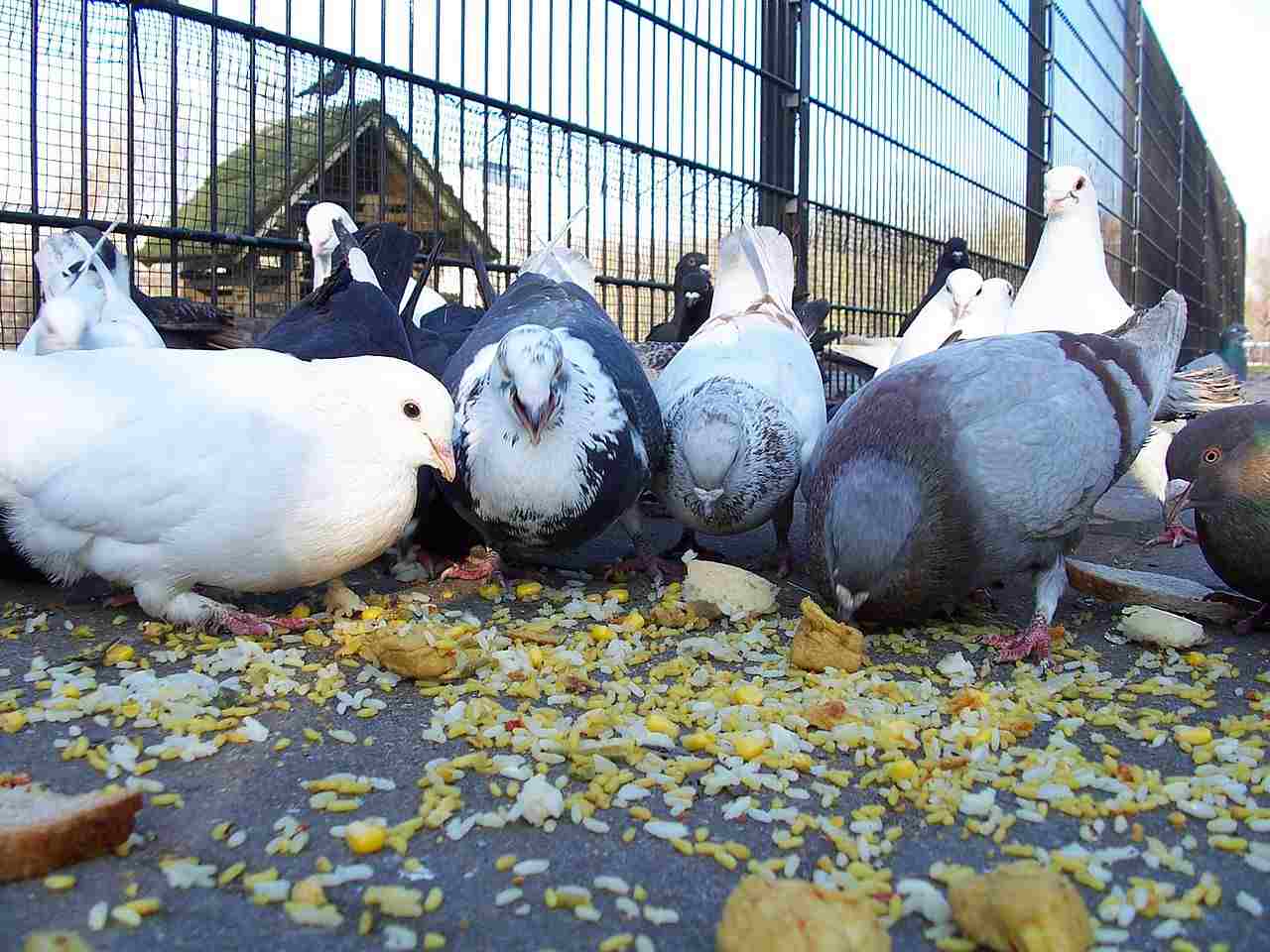
3. Can Pigeons Eat Bread?
Yes, pigeons can eat bread, but it should be given sparingly. Bread lacks sufficient nutrients that pigeons need for optimal health, and it can also cause constipation and other digestive problems. Therefore, it’s important to offer bread as an occasional treat rather than a regular part of their diet.
When feeding bread to pigeons, it’s best to break it into small pieces to make it easier for them to eat. Additionally, it’s important to ensure that the bread is not moldy or stale, as this can be harmful to pigeons. Fresh, whole grain bread is a better option compared to processed white bread, as it contains more nutrients.
4. What Can Pigeons Eat and Drink?
Pigeons have a diverse diet and can eat a variety of foods. They can consume grains, vegetables, seeds, fruits, nuts, insects, mollusks, and worms. These provide the necessary nutrients for their overall health and well-being. When it comes to drinking, pigeons can obtain water from various sources.
They can drink water directly from feeders, temporary puddles, and water bodies. Additionally, pigeons may also get water from the food they consume. It is important to ensure that the water sources are clean and free from contaminants to maintain the pigeons’ health. Providing a balanced diet and access to clean water is essential for the overall health and vitality of pigeons.
5. What Grains do Pigeons Eat?
Pigeons have a varied diet that includes a range of grains. Some of the grains that pigeons commonly eat include rice, wheat, barley, sorghum, millet, and corn. These grains provide pigeons with essential nutrients and energy to support their daily activities and overall health.
Grains are a staple food for pigeons and are readily available in many environments. Pigeons are able to digest and utilize the nutrients from these grains effectively. They have a strong beak that allows them to crack open the outer shell of the grains and access the nutritious inner part.
Including a variety of grains in a pigeon’s diet ensures that they receive a balanced mix of nutrients. It is important to provide grains in their natural, unprocessed form to maximize their nutritional value.
When feeding pigeons grains, it is recommended to scatter the grains on the ground or use a bird feeder to mimic their natural foraging behavior.
6. What Can Pigeons Eat in The Winter?
During the winter months, pigeons require a diet that provides them with both energy and warmth. To meet their nutritional needs, pigeons can eat a variety of fibrous and energy-rich foods. Barley is an excellent option as it is high in fiber and provides pigeons with the necessary carbohydrates to stay active and warm. Dried fruits, such as raisins or dried berries, are also a good choice as they are packed with natural sugars that provide pigeons with a quick energy boost.
In addition to these foods, pigeons can benefit from consuming pellets specifically formulated for their dietary needs. These pellets are designed to provide a balanced mix of nutrients, including proteins, vitamins, and minerals, which are essential for pigeons’ overall health during the winter season. Lentils are another great option as they are rich in protein and can help pigeons maintain their energy levels.
When feeding pigeons in the winter, it is important to ensure that the food is easily accessible and protected from the elements. Placing the food in a covered feeder or scattering it on the ground can help prevent it from getting wet or frozen. Providing a consistent source of food throughout the winter months will help pigeons stay nourished and healthy during this challenging season.
By offering fibrous and energy-rich foods like barley, dried fruits, pellets, and lentils, you can help pigeons thrive during the winter.
7. What do Baby Pigeons Eat?
Baby pigeons, also known as squabs, have specific dietary needs to support their growth and development. Initially, they are naturally fed regurgitated crop milk from adult female or male pigeons. This crop milk is similar to mammalian milk and contains proteins, antioxidants, and fats that are essential for the baby pigeons’ nutrition.
If you need to feed baby pigeons yourself, you can use bird baby formula from a pet store or even human baby cereal, ground corn, and peas. It is important to serve the food warm and use a small utensil, such as a straw, to provide liquidated food. Care should be taken to offer small amounts to avoid injury or suffocation.
Baby pigeons should be fed regularly, up to five times a day, to ensure they receive the necessary nutrients for their growth. As they grow older, typically from birth until one and a half to three weeks, they can start to eat other foods like small-sized seeds and grains.
8. What to Feed Pigeons at Home
When it comes to feeding pigeons at home, there are several options to consider. Pigeons can be fed a variety of grains such as rice, corn, millet, and sorghum, which provide essential nutrients for their diet. Additionally, small amounts of bread, pasta, and oats can be included in their meals.
If you prefer to make homemade feed for pigeons, you can mix different grains and seeds to create a balanced diet. Some popular ingredients for homemade pigeon feed include cracked corn, milo, sunflower seeds, and wheat. It’s important to ensure that the feed is fresh and free from any contaminants.
9. Can Pigeons Eat Bananas?
Bananas are one of the fruits that pigeons can eat. They are not only delicious but also provide essential nutrients for these birds. Bananas are a great source of fiber, which aids in digestion and helps maintain a healthy digestive system for pigeons. Additionally, bananas contain various vitamins that contribute to their overall well-being.
Feeding pigeons bananas can be a simple and nutritious addition to their diet. However, it’s important to remember that moderation is key. While bananas are safe for pigeons to consume, they should be given in small amounts as part of a balanced diet. Too much of any one food can upset their nutritional balance and potentially lead to health issues.
When offering bananas to pigeons, it’s best to provide them in small, bite-sized pieces. This makes it easier for the birds to eat and reduces the risk of choking. Additionally, ripe bananas are preferred as they are softer and easier for pigeons to digest.
Incorporating bananas into a pigeon’s diet can be done alongside other suitable foods. Pigeons have a diverse diet and can consume a variety of grains, fruits, and vegetables.
20. What do Pigeons Eat in The City?
Pigeons in the city have a varied diet that includes berries, fruits, insects, worms, leftover grains, and even human food like bread. These resourceful birds are able to find food in urban environments by foraging in parks, gardens, and even scavenging from trash bins. Berries and fruits provide pigeons with essential vitamins and antioxidants, while insects and worms offer a source of protein.
Leftover grains, such as rice or oats, are also commonly consumed by city pigeons. However, it’s important to note that while pigeons can eat human food like bread, it should be given in moderation as it lacks the necessary nutrients for their overall health.
21. Can Pigeons Eat Oats?
Yes, pigeons can eat oats. Oats are a nutritious grain that provides pigeons with essential carbohydrates and fiber. They can be a healthy addition to a pigeon’s diet, especially during the winter months when other food sources may be scarce.
Oats can be offered to pigeons in their whole form or as part of a birdseed mix. However, it’s important to ensure that the oats are clean and free from any contaminants or pesticides. Offering oats in moderation alongside a balanced diet will help to keep pigeons healthy and well-nourished.
22. Can Pigeons Eat Blueberries?
Yes, pigeons can eat blueberries, as well as other berries like blackberries, raspberries, and strawberries. Blueberries are a nutritious fruit that can provide pigeons with essential vitamins and antioxidants. They can be a healthy addition to a pigeon’s diet, offering a variety of flavors and textures.
However, it’s important to remember that blueberries should be offered in moderation, as too much fruit can upset a pigeon’s digestive system. Additionally, make sure to wash the blueberries thoroughly before feeding them to pigeons to remove any pesticides or contaminants. Providing a balanced diet that includes a variety of foods will help to keep pigeons healthy and satisfied.
23. What Smells do Pigeons Hate?
Pigeons have a strong aversion to certain smells. Some smells that pigeons hate include garlic, onion, chili pepper, vinegar, citronella, cinnamon, and black pepper. These strong and spicy smells can be effective in deterring pigeons from certain areas. By using these scents strategically, you can discourage pigeons from roosting or nesting in unwanted places.
For example, sprinkling crushed garlic or black pepper around your balcony or garden can help keep pigeons away. However, it’s important to note that while these smells may be effective in repelling pigeons, they should be used in moderation and with caution, as excessive amounts of these substances can be harmful to the birds.
24. Is Bread Bad for Pigeons?
Bread is not the ideal food for pigeons. While they may eat it, it is not nutritionally balanced for them. When consumed in excess, bread can cause digestion problems for pigeons. Additionally, bread that is excessively sweetened or salted can be harmful to their health. It is important to note that pigeons need a varied diet that includes grains, seeds, fruits, and vegetables to meet their nutritional needs.
Feeding them a diet solely consisting of bread can lead to malnutrition and health issues. Therefore, it is best to limit the amount of bread given to pigeons and provide them with a more balanced diet that includes their natural food preferences.
25. What is a Pigeon’s Favorite Food?
A pigeon’s favorite food primarily consists of grains and seeds. However, the specific types of grains and seeds that pigeons prefer can vary depending on their species, environment, and the availability of food. Pigeons are known to enjoy eating a variety of grains such as corn, wheat, barley, and millet. They also have a preference for seeds like sunflower seeds and safflower seeds.
These food sources provide pigeons with the necessary nutrients and energy they need to thrive. It is important to note that while grains and seeds are a pigeon’s favorite food, they still require a balanced diet that includes fruits and vegetables to meet their nutritional needs.
26. What are Pigeons Sensitive To?
Pigeons are sensitive to certain types of food. They are particularly sensitive to heavily salted and sweetened foods, as well as those with active odorous chemicals like garlic and onions. These types of food can be harmful to pigeons and should be avoided. Additionally, pigeons are sensitive to sound and light. Loud noises and bright lights can startle them and cause them to fly away or become stressed.
It is important to create a calm and quiet environment for pigeons, especially if you are keeping them as pets or feeding them in your backyard. By being mindful of their sensitivities, you can ensure the well-being and comfort of these birds.
27. Can Pigeons Eat Chocolate?
Yes, technically pigeons can eat chocolate, but it is not good for them. Chocolate contains theobromine, a substance that is toxic to birds. Feeding chocolate to pigeons can lead to various health issues, including digestive problems, increased heart rate, and even death in severe cases.
It is important to remember that pigeons have different dietary needs than humans, and certain foods that are safe for us can be harmful to them. Therefore, it is best to avoid feeding chocolate or any other human treats to pigeons. Instead, provide them with a balanced diet of seeds, grains, fruits, and vegetables to ensure their health and well-being.
28. How do Pigeons Find Food?
Pigeons have several ways of finding food. One method is through seasonal migration, where they travel to areas with abundant food sources. They also engage in foraging, actively searching for food on the ground or in trees. Pigeons are skilled scavengers and can find food in urban areas by picking up scraps left by humans.
Their keen eyesight and hearing play a crucial role in locating food. Pigeons can spot food from a distance and quickly fly towards it. They are also able to hear the sounds of other birds or animals feeding, which helps them locate potential food sources.
29. Can Birds Eat Pears?
Yes, birds, including pigeons, can eat pears. Pears are a nutritious fruit that can provide birds with essential vitamins and minerals. They are a good source of hydration and can be a tasty treat for pigeons.
However, it’s important to note that pears should be given in moderation when feeding these birds, as part of a balanced diet. Too much fruit can upset a bird’s digestive system. It’s also important to remove any seeds or pits from the pears before feeding them to birds, as these can be harmful.
30. Where Do Pigeons Live?
Pigeons are very versatile birds and can be found in a variety of habitats. They can be seen in rainforests, swamp forests, deciduous forests, boreal forests, deserts, urban areas, and coastal ecosystems. These adaptable birds are able to thrive in different environments as long as there is an abundance of food, water, and shelter available.
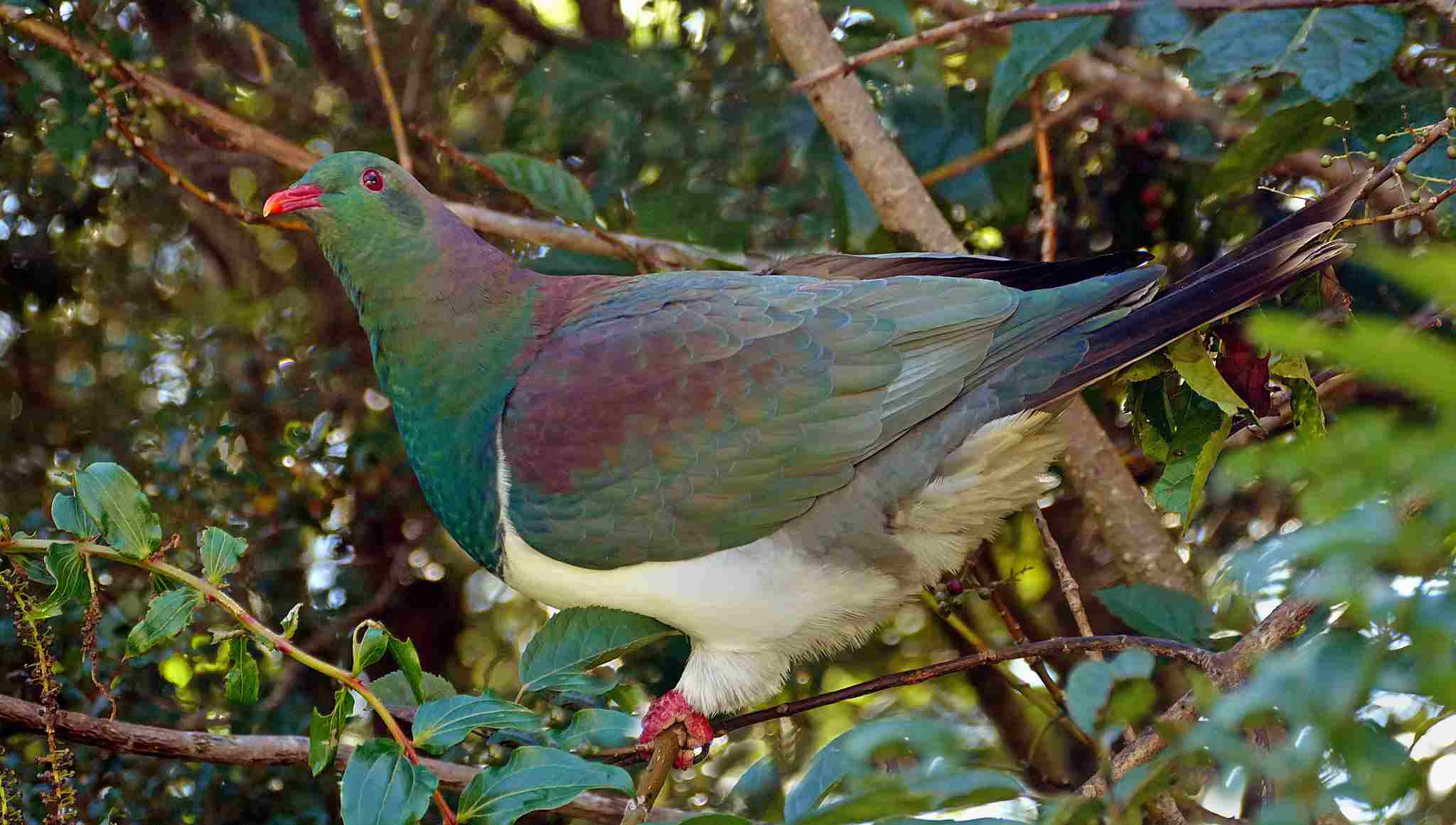
In urban areas, pigeons have become a common sight, often seen perched on buildings or gathering in parks and plazas. They have adapted well to city life, taking advantage of the food scraps and shelter provided by human activities. Pigeons are also known to nest on ledges and rooftops.
In natural habitats, pigeons can be found nesting in trees or cliffs, depending on the species. They build simple nests using twigs and other materials they find in their surroundings.
